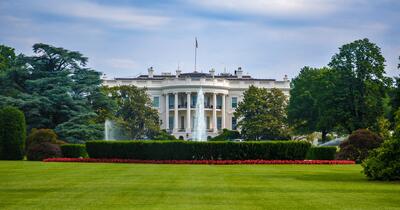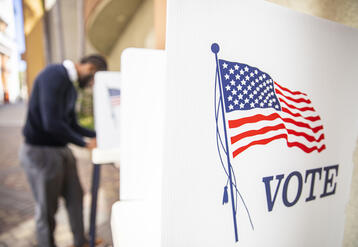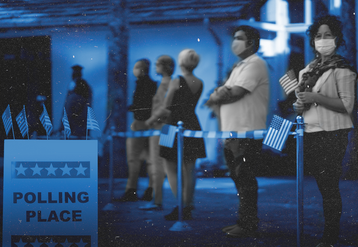
On the Anniversary of Bloody Sunday, a Look at President Biden’s Voting Access Executive Order
We must not underestimate the progress and untapped potential of this executive order.

Last year on this day—March 7th, the anniversary of Bloody Sunday—President Biden issued an Executive Order Promoting Access to Voting. The “Bloody Sunday EO” affirmed the fundamental nature of the right to vote in our democracy, acknowledged that the right to vote has most often been denied to Black and brown Americans historically and today, and asserted that the federal government has a responsibility to protect that right by ensuring that all eligible Americans can register to vote and participate in our democracy.
[T]he Bloody Sunday EO [orders] federal agencies to do what they can to promote access to voter registration and voting for the Americans they serve.
To meet that responsibility, the Bloody Sunday EO goes on to order federal agencies to do what they can to promote access to voter registration and voting for the Americans they serve. This mandate includes creating and submitting to the president voter registration and education plans, as well as accepting designation as voter registration sites under the National Voter Registration Act (NVRA), among other important charges.
We described the opportunity in more detail when the EO was issued last year. In short: the Bloody Sunday EO represents a significant, and previously untapped, opportunity to mobilize our federal government’s programs and resources to help millions of Americans push past a key barrier to the ballot, and in so doing, to build a more inclusive democracy.
After having advocated for such executive action on voting rights, Demos immediately began working to ensure this EO is implemented as effectively as possible, leaning on our significant experience advancing voter registration in state agencies over the last nearly two decades.
Over the past year, in close partnership with the ACLU and other allies, we have:
- Conducted extensive research on the federal agencies and the programs they administer (as well as those programs they fund state and local governments or third parties to run), identifying those that have significant potential for impact based on the numbers and demographics of the people they serve.
- Organized agency-based working groups and met with staff in these agencies to provide technical expertise as they developed their initial voter registration plans, to ensure those plans reflect the knowledge and priorities of various agency stakeholders.
- Developed research and resources to assist and advance agency efforts to implement robust voter registration opportunities, including a slide deck explainer of the agencies’ potential for impact, best practices for conducting voter registration at federal agencies, and recommendations for modernizing and improving the accessibility of Vote.gov, especially for limited English proficient voters and voters with disabilities, among various other resources.
- Worked closely with state partners to seek designation of key federal agencies as official NVRA agencies—the best way to ensure federal agencies provide comprehensive voter registration services, thanks to the NVRA’s strong requirements on how agencies must conduct registration.
- Engaged with other stakeholders across the federal government and in the states to leverage Demos’ expertise, tools, and relationships to advance the goals of the Bloody Sunday EO.
A year into implementation, we are encouraged by the efforts from some agencies to meet the charge of the Bloody Sunday EO[.]
A year into implementation, we are encouraged by the efforts from some agencies to meet the charge of the Bloody Sunday EO and to do their part to advance greater access to our democracy for the people they serve.
In particular, we are glad to see that Indian Health Services is committed to providing voter registration services and assistance to its patients (something Demos has recommended for years), and that the Department of the Interior will do more to share registration and voting information with Native students, as well as offering up Tribal Colleges and Universities for designation as NVRA voter registration agencies. Native Americans face some of the most significant obstacles to voting and, as a result, experience some of the lowest registration and participation rates election after election, so these commitments are particularly meaningful in moving us toward a more inclusive democracy. We are also thrilled that the Department of Health and Human Services will provide access to and assistance with voter registration to the millions of users of HealthCare.gov—and have provided them detailed guidance on how to do so effectively. And we are hopeful about a handful of additional developments underway at other departments and agencies.
At the same time, we know there is much more federal agencies can do.
At the same time, we know there is much more federal agencies can do. The progress we’ve seen so far from some agencies must be only the starting place, and we need to see considerably more from other agencies—and from the Biden administration—for the Bloody Sunday EO to be considered a success.
As just a few examples, the Department of Education should integrate voter registration into the FAFSA application process so that students seeking financial aid have the opportunity to register or update their registration; young people and low-income people are registered at persistently lower rates than their older and higher-income peers. U.S. Citizenship and Immigration Services should improve its current voter registration services at naturalization ceremonies, to ensure all newly-eligible new Americans—who register and vote at lower rates than non-naturalized U.S. citizens election after election—have the meaningful opportunity to register to vote and make their voices heard in our democracy. The Department of Housing and Urban Development should integrate voter registration requirements or encouragement into all public housing programs possible.
Additionally, the White House must work harder to ensure these and other agencies do more than they’ve currently committed to do. President Biden ran on a commitment to voting rights and to racial equity, and has been a vocal spokesperson for both during his first year in office. Especially in light of challenges passing federal legislation, how much progress we’re able to make on these issues during his presidency will depend on how effectively he fights for the Bloody Sunday EO and, relatedly, his racial equity executive order.
The good news is there are clear steps the administration and agencies can each take to meet the mandate of the Bloody Sunday EO. These steps include:
- Agencies whose initial plans were not ambitious releasing new or additional commitments.
- Agencies with stronger initial plans following through to make high-quality voter registration services accessible to their clients.
- The president and Congress, though the FY23 budget and appropriations process, adequately resourcing these agencies’ voter registration efforts.
- Secretaries of state, chief election officials, and other relevant state parties seeking designation of federal agencies in their states as voter registration agencies under the NVRA.
The important role that federal agencies have to play in minimizing registration as a barrier to the ballot box and moving us closer to an inclusive democracy has long been clear. However, in the face of Republican obstruction in the Senate and stalled progress on federal legislation protecting the right to vote, effective implementation of the EO is more urgent than ever. Progress on the Bloody Sunday EO over its first year has been promising, but significant further action is needed.
Demos and partners will continue to support the administration and agencies to do more—and we look forward to continued and strengthened efforts from them to promote access to registration and voting.



